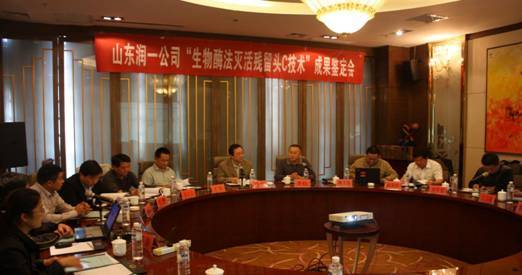15
2023
-
02
Shandong Runyi Biotechnology Co., Ltd. successfully passed the appraisal of the process technology of biological enzyme inactivation of cephalosporin C residues in fermentation residue

On October 11, 2015, Li Aiguo, the director of the EHS Center, and Dong Chao, the manager of the project information department, organized the technical achievement appraisal meeting of the “Technology Achievement of Residue of Cephalosporin C in Bioactive Enzyme Inactivated Fermentation Residues” by Shandong Runyi Biotechnology Co., Ltd. The meeting's appraisal expert group was composed of Ma Chen, a doctoral tutor of Shandong University, Yu Jun of Shandong Provincial Institute of Environmental Protection Research and Design, Jiang Wenqiang, a professor at Qilu University of Technology, and Liu Shiwen, director of the Solid Waste and Hazardous Chemicals Pollution Prevention Center of the Provincial Department of Environmental Protection.
The biological enzymatic inactivation of cephalosporin C residue in the fermentation residue uses cephalosporin fermentation residue as the main material, and the fermentation strain is used as a biological enzyme preparation to be added to the fermentation residue for inactivation and degradation, so that cephalosporin C remains Completely inactivated. After inactivation, the bacterial residue is mixed with a certain proportion of plant straws for compost fermentation. The products obtained from the compost fermentation all meet the standards of organic fertilizers, and there is no residue of cephalosporin C.
After various topics such as the report of the project leader, questioning by experts, and expert evaluation, the meeting finally determined that the successful research and development of the technology solved the problem of the processing direction and processing cost of fermentation bacterial residues from domestic fermentation production enterprises, reducing environmental pollution and achieving Energy-saving emission reduction and the harmlessness, reduction and resource utilization of bacterial residues, this technology fills the domestic gap and has important strategic significance for promoting the development of China's fermentation industry.
Related news






